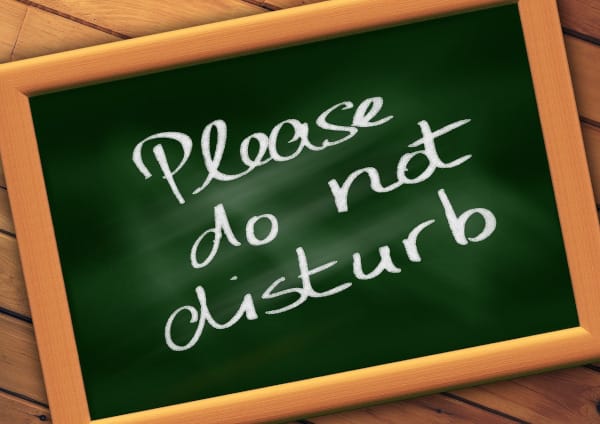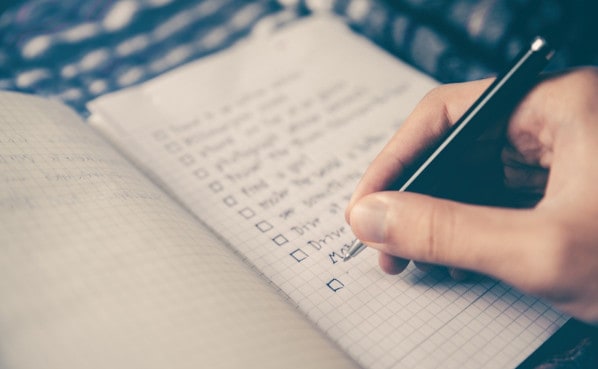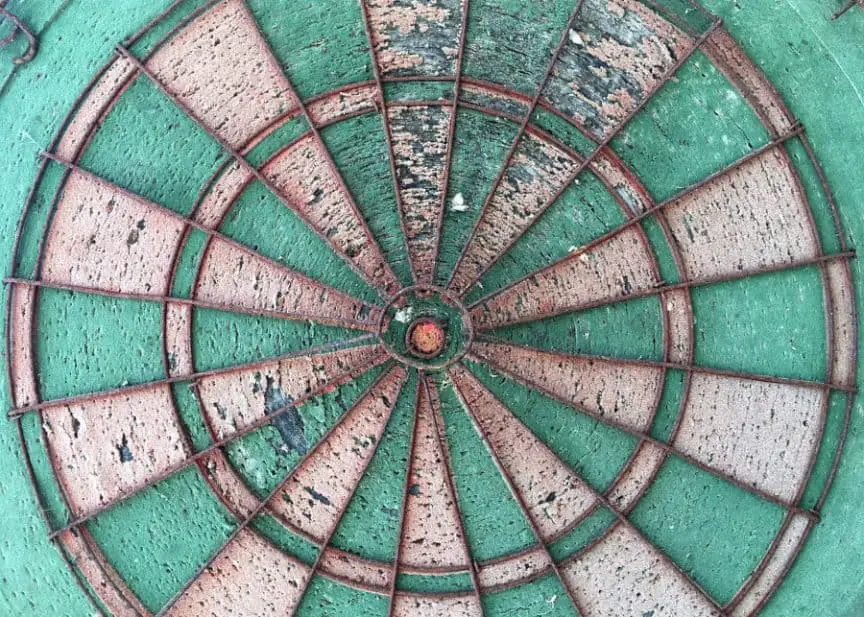Everyone has goals that they want to achieve. However, learning how to stay focused on your goals and avoid distractions is more important than setting goals. Because you can set as many goals as you want, but if you don’t follow through, you won’t achieve any of them.
This guide walks you through nine things you can do to stay on track and avoid getting distracted while working towards your goals. Without further delay, let’s dive in.
Step 1: Get Rid of All Distractions in your Workspace
According to research, the best working environment is a quiet one. Many of you might disagree with this because you prefer listening to music. White noise, or the TV while you work.
But even though background noises may improve your desire to work, they don’t necessarily improve your productivity. At best, they will help you create some liveliness in an otherwise boring work environment.
The worst kind of distraction to have is people. According to this study, researchers proved that the conversations you hear in the background are extremely damaging to your productivity.
And this is the most common type of noise you’ll encounter in a workplace environment. That’s why we use music and white noise to mask the voices of workmates and other people, which can be far more distracting.
So, here’s what to do:
- Try to work in a quiet environment whenever possible. It is the most conducive environment to work in, especially if your job involves reading and comprehension.
- Use white noise and music only to mask the sound of conversation. They may boost your mood and make you feel more productive, but they will also slow down your reading and comprehension ability.
- Tempting as it may be to turn on the TV as background noise as you work, it is still a distraction. When trying to focus on your work, try to eliminate everything else that is even slightly distracting.
Take a look at these Isochronic Tones recordings. Choose the one that suits you best. Opens in new tab

Step 2: Complete the Most Important Things First
One of the best strategies to use when you want to make continuous progress on your goals is to do the two or three most important tasks early in your day. These are the tasks that have the most impact on your progress.
Do them first thing in the morning when you’re still fresh and energetic. If you wait, you’ll only be creating room for distractions and killing your momentum. Distractions can kill your willpower long before the day is over, so try to muster as much energy as you can when you wake up to focus it all on your most important activities.
It sounds simple because it is. When you complete your most important tasks early in the day, you get the confidence to go beyond your to-do list and accomplish more. You will also feel much happier and satisfied because you have successfully done something to get closer to your goals.
Starting with your most important tasks has another advantage: you can avoid mistakes when you work early in the morning as you’re more attentive. That makes you capable of achieving near-perfection in your most important daily tasks.
And if you get started with the most important jobs early in the morning, you’ll have enough steam to power through other jobs during the day, so ultimately, you’ll be able to accomplish a lot more when the day is over.
Related reading: How to Achieve a Goal Successfully – Opens in new tab
Step 3: Don’t Multitask
Let’s be honest: we have all tried to do more than one thing at a time because we think we’re saving time. In reality, multitasking is pretty bad for productivity. You’re more likely to do two activities wrong than to do one correctly when you multitask.
What exactly is considered multitasking?
- Taking on two activities at the same time
- Alternating between two different activities
- Performing several tasks in rapid succession and allowing them to overlap
How bad is multitasking for your productivity?
According to research, you lose about 40 percent of your productivity when you multitask. That means doing two things at the same time makes you about half as productive. The irony is that we expect to be at least twice as productive when we multitask.
Why does multitasking make us less productive?
Because our brains aren’t wired to switch from task to task rapidly. Every time you disengage from one activity and move to the other one, your brain is open to a million distractions.
By the name Clifford Nass, a Stanford University professor, also discovered that multitasking reduces your brain’s recall (remembering) power, cognitive function, and overall efficiency. What’s worse, the more you get “better” at multitasking, the more you lose your ability to concentrate.
Therefore, multitasking is not something you want to practice when you’re learning how to stay focused on your goals.
Step 4: Break your Goals Down
It’s good to focus on the big picture of your goals, but don’t forget to break them down into attainable milestones. You’re going to get discouraged if your goals take months or years to accomplish.
Breaking your main work down into bite-sized tasks can greatly improve how you approach your goals. Completing smaller tasks will give you more motivation to keep working towards your goal. However, if you feel like you’re working and working but not making any meaningful progress, you might want to give up.
Your goals need to look manageable. That includes how they appear on paper. If your to-do list looks like a bestselling novel, you won’t be eager to tackle it, whereas if it contains two or three activities, you’ll be more inclined to get through it as quickly as possible.

Step 5: Track your Progress
Setting goals is easy. Everyone can do it. The hard part, which is the most crucial for success, is tracking your progress, making sure that you’re getting closer to your goals with each burst of effort.
It is impossible to achieve your goals if you don’t track your progress. That’s because you need feedback on your progress to know whether you’re doing the right thing and to understand the things you need to change.
There are various ways to keep track of your progress. Some people prefer the old-fashioned method—writing it down. Writing down your progress has the advantage of being highly customizable. You’re not restricted to a specific formula; you’re only doing what works for you.
I’d say that keeping track of your goal progress with a pen and paper is the best way to start, especially if you don’t know what exactly works for you. It allows you to note down the effective things you’ve tried and mark the mistakes you shouldn’t repeat.
In terms of flexibility, I think the old-fashioned method of keeping track of your progress is better. Better than digital methods, at least.
That’s not to say that you won’t find value in a progress-tracking app. There are endless productivity tools in today’s digital world that allow you to monitor your progress with unprecedented ease and convenience.
While they make goal management easier, they’re not very adaptable to unique needs. Still, you have a plethora of them to choose from, so you’re bound to find a digital planner that’s suitable for tracking your goal progress.
Of more importance is picking the method that works for you. Don’t opt for a paper planner or a digital planner just because it seems effective for others. Stick with what brings results for you.
Step 6: Review your Goals Every Day
Life has a way of changing, and as it does, so do your core values, beliefs, and goals. If you’re serious about achieving your goals, then you must be serious about reviewing them every day.
Reviewing your goals does two important things:
- It allows you to incorporate new ideas that you get along the way into your bigger picture, and;
- It keeps your goals at the front of your mind.
When your goal is the first thing on your mind when you wake up, you will focus most of your efforts on achieving it. A goal is not like an alarm that you set and forget. Thinking about it, reviewing it, and adjusting it are three activities that are vital for your success.
If you’re constantly thinking about your goals, your mind will subconsciously block out everything else, including distractions that can slow down your progress. Reviewing them gives you renewed commitment, whereas repetitively going through your goals eventually makes your constructive actions automatic.
When your mind is focused on your goals and only those, then all your activities gradually reform to accommodate the lifestyle that is conducive towards achieving your goals.
Related reading: Scientific Studies on Positive Thinking – Opens in new tab.
Step 7: Keep your Momentum Going
A lot of us take everything else for granted once we narrow our focus to achieving our goals. We forget that it takes continued effort to keep working at it even when our willpower is at its lowest.
That’s why one of the best things you can do for your progress is to consciously manage your momentum.
Here’s a feeling that you’re probably familiar with: you’ve been working hard all week, and as you welcome the weekend, you feel like you should ease off or maybe forget about your goals for an entire day.
After all, you deserve it for all your hard work, right? Wrong.
When you take a hiatus from chasing your goals, your vision may not be affected, but your momentum dips significantly. In other words, it becomes so much harder to get going again, and this where doubt and distractions creep in.
Momentum management is about keeping your efforts consistent come rain come sunshine. Your goals don’t take a break on the holidays, and neither should you. However, I’m not saying to disregard the rest days. Just do something, no matter how small, to improve your progress.
For example, if you run five kilometers every morning on weekdays, you can walk three kilometers on the weekends. Or, if you write 2,000 words every day for your novel, write 500 words on weekends on holidays. Just do something.
Your momentum is going to decide how quickly you achieve your goals. If you let it dip, then you’ll struggle with getting back on track, which might cost you valuable time.
Step 8: Practice Focusing Techniques
No one is naturally adept at staying focused. True concentration comes from continued practice, and if you’re serious about learning tricks that will teach you how to stay focused on your goals, then you’ll need to practice some focusing techniques.
One highly effective method is the Pomodoro Technique. Developed by Francesco Cirillo in the 80s, this technique requires the use of a timer to break down your productive hours into 25-minute portions.
Each 25-minute session is known as a Pomodoro and is separated from the next by a short break. The breaks can be between 3 and five minutes for the first three sessions and between 15 and 30 minutes for session four and beyond.
You can also practice habits that improve your focus. These may include visualization, ruthless time management, and maintaining a neat, organized workspace.
One way to build up your concentration ability is to meditate. Meditation increases overall awareness, reduces stress, and strengthens your focus muscle, making you capable of concentrating on a single task whenever you need to.
Planning is one way to ensure that you stay focused on your current task. Most of the distractions we get come from tasks we haven’t done yet. When you feel like you should be doing something else, you won’t have an easy time focusing on your current task.
Any of these methods can be used to sharpen focus and improve concentration.
Related reading: How to Get Rid of Negative Influences in Your Life? – Opens in new tab.
Step 9: Get Up Early in the Morning
If you feel like your days are too short to accomplish everything you need to, there is a simple workaround for this.
Just get up earlier.
You’re effectively increasing the number of hours in your day when you wake up earlier than usual. Plus, early morning is a very peaceful time, so it is highly conducive to productivity.
Productivity experts recommend using the first few minutes of your day to plan and organize your tasks. You can also use this time to review your goals. Looking at your vision board immediately after you wake up can help you re-focus on your goals.
The early bird always catches the worm. That’s because they have enough time to plan and create a strategy. Waking up early can have the same benefits for you.
Reward yourself for Every Milestone Achieved
This guide on how to focus on your goals and avoid distractions would not be complete without this final point. Rewarding yourself for your accomplishments is very important. It motivates you, shows you that your hard work is paying off, and helps you tick off your journey’s important milestones.
Rewards are going to be a big source of willpower going forward. When you notice that your efforts are spawning results, you will be incentivized to put more effort into achieving your goals.
Related reading: The Power of No: Tips to Build Healthy Boundaries – Opens in new tab.
Stay in Touch
 Join our newsletter by using the forms on this website or click here!
Join our newsletter by using the forms on this website or click here! Follow us on Google News
Follow us on Google News Follow us on Facebook
Follow us on Facebook
Featured Image by Alex Fragoso from Pixabay








